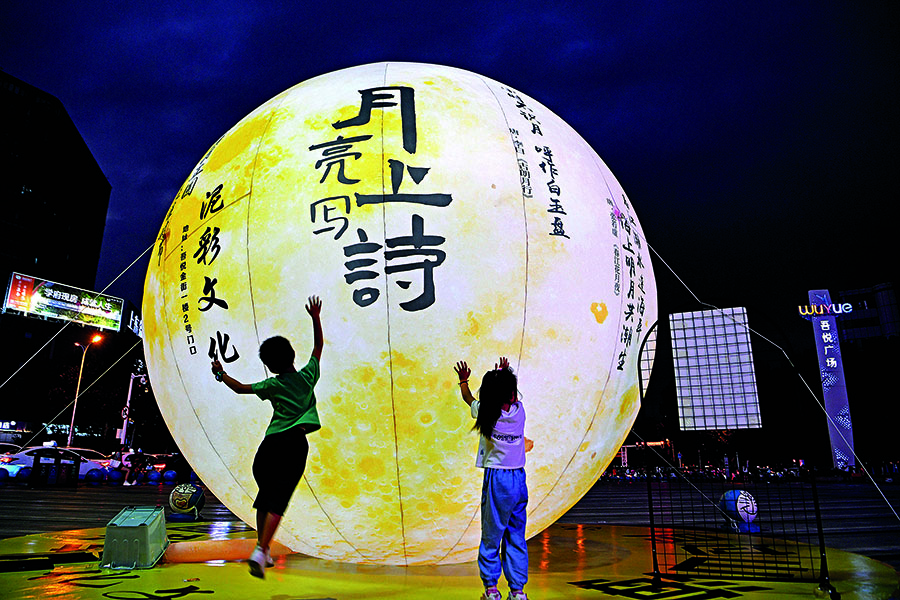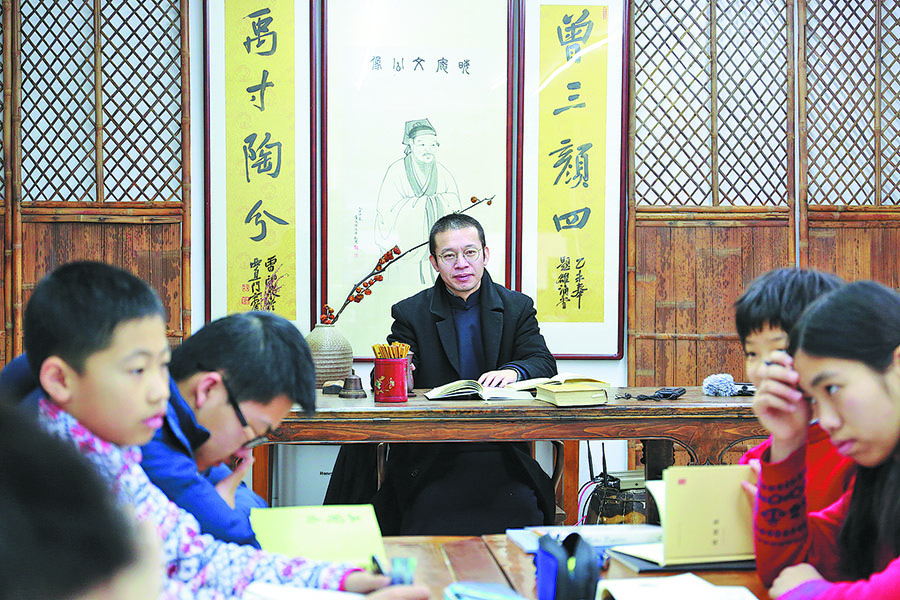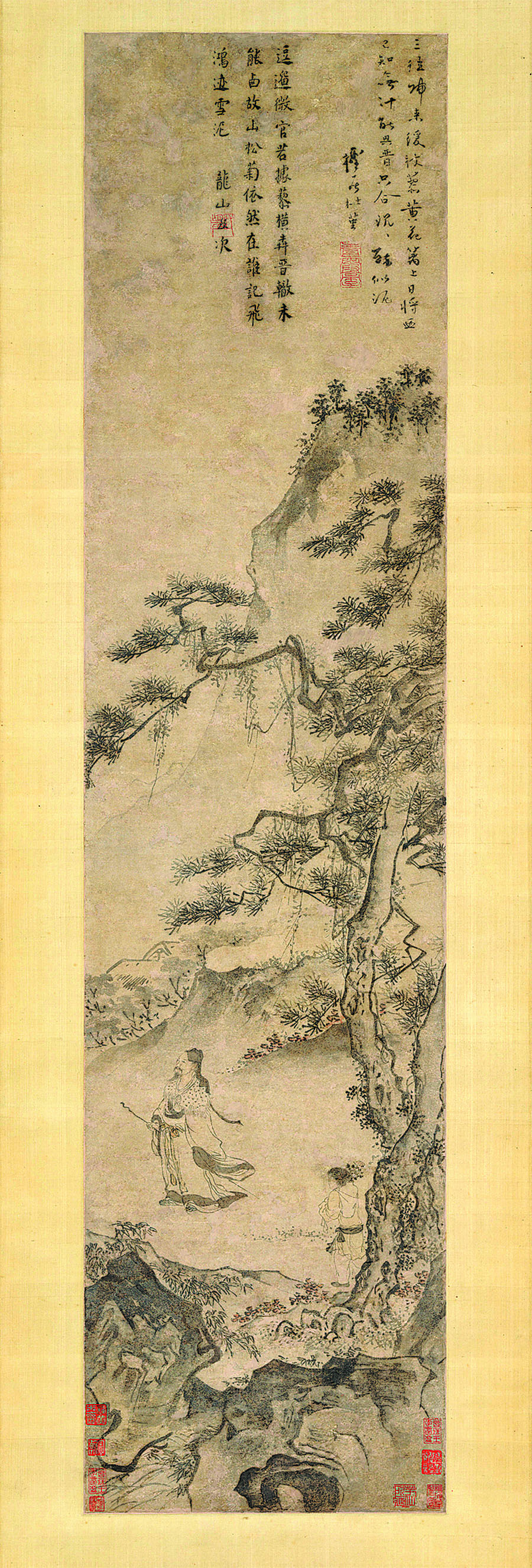Weight of early poetry felt through the ages
CHINA DAILY2025-06-10 21:05

Two children play with a moon-shaped balloon printed with ancient poems in Huainan city, Anhui province, last September. [PHOTO BYCHEN BIN/FOR CHINA DAILY]
Bureaucrats in ancient China had to have knowledge of verse as reflection of their soul, Zhao Xu reports.
What did poetry mean to the ancient Chinese? Confucius (551-479 BC) offered an answer. "Poetry can inspire the mind, offer insight, foster social connection, and give voice to discontent," he declared inThe Analects, a philosophical text composed of sayings and ideas attributed to Confucius and his disciples.
As ancient China's foremost moral guide, Confucius was referring to a specific collection of poems: theShi Jing(literally Classics of Poetry, more commonly translated as theBook of Songs), the oldest surviving anthology of Chinese poetry, containing 305 works dating from the 11th to 6th centuries BC. AlongsideThe Analects(Lunyu in Chinese), theBook of Songshas long been regarded as a cornerstone of Confucian thought. For over two millennia, it was essential reading for aspiring bureaucrats, who were required to demonstrate their understanding of its verses in the rigorous civil service examinations.
"To select officials based on their knowledge of poetry — though it may seem slightly odd at first — rests on a deeper logic: that writing, and poetry in particular, is a reflection of the soul," says Zhang Yinan, a researcher from the National Library of China.
"A poet remains a poet even when not writing verse, for being a poet is an existential state of mind: One that fosters heightened sensitivity and the ability to see from a broader, more historical perspective. Those lacking such depth were deemed unfit to govern."
In other words, the act of writing poetry, as an often idiosyncratic if not entirely whimsical pursuit, was deeply entwined with politics in ancient China. That tradition was set byShi Jing, says Tan Zuowen, who teaches ancient Chinese literature at Beijing's Capital Normal University.

Tan Zuowen, who teaches ancient Chinese literature at Beijing's Capital Normal University, presides over his poetry class with younger students.[Photo provided to China Daily]
"The 160 poems inGuo Feng(The Airs of the States), the first and largest section of the book, were traditionally regarded as folk song lyrics. However, their literary sophistication suggests they were at least partly composed by educated members of society, who drew on everyday scenes and narratives to express personal reflections and political sentiments," Tan says. "The rhetorical techniques employed in this process, most notably the use of metaphor, analogy, and evocative imagery such as natural landscapes, were later woven into the fabric of the Chinese poetic tradition."
One example features the image of a "fat rat" as a symbol of greedy exploiters, offering a sharp critique of social injustice. In another, the lines "The reeds and rushes grow lush and green, the white dew turns to frost" open a poem with a misty, ethereal atmosphere, setting the tone for a poignant expression of longing.
"Longing for what? Many modern readers interpret it as yearning for the beloved," Tan says, referring to the termyi ren, meaning "that person".
"What they often overlook is that, to the poem's contemporaries, it did not signify a romantic lover, but a junzi, a noble gentleman who embodies the moral ideals. It is from this that its political connotation arises."
One such figure was Qu Yuan (c.340-278 BC), a poet and aristocrat for whom theShi Jinghad almost certainly served as a foundational text. Remembered as a tragic patriot, Qu Yuan took his own life in despair, drowning himself 55 years before the fall of his homeland, the State of Chu. His poems, marked by their distinctive rhythm and political overtone, overflow with vivid imagination and a deep, brooding sense of escapism.
Through his work, now known collectively asChu Ci(The Songs of Chu), Qu Yuan established new traditions in Chinese poetry, notably the articulation of profound political disillusionment and the use of nature-bound escapism as a form of emotional refuge. While others contributed to theChu Citradition, the majority of surviving works in this genre are attributed to Qu Yuan himself.
Banished to remote and desolate regions, he transformed long-distance travel into a metaphor for exile: both imposed and self-chosen. Over the two millennia following his death, countless poets, especially scholar-officials, echoed this theme. Their travel poems, rich with allusions to political marginalization, gave rise to a uniquely enduring motif in the history of Chinese literature.
"From theBook of Songs to The Songs of Chu, a crucial transition occurred from the collective expression of emotion to a more individualistic one," Tan says. "This shift brought Chinese poetry closer to what poetry ultimately aspires to be: a vehicle for conveying inner experience."
He notes that, as a Confucian classic,Shi Jinginevitably carried a public and communal character.
Occasionally, that inner experience is not meant to be shared, at least not publicly. This, Tan explains, gives rise to a fifth function of poetry, beyond the four outlined by Confucius. "Poetry can conceal, or more precisely, it allows one to conceal oneself, to become a spiritual hermit within the lines, seeking refuge in verse just as a recluse finds sanctuary in nature."

A late 15th- to early 16th- century painting of Tao Yuanming enjoying chrysanthemums by Du Jin from the Metropolitan Museum of Art in New York.[Photo provided to China Daily]
One such figure is Tao Yuanming (365-427), a poet who renounced official life to spend his days in wine-accompanied seclusion: "Plucking chrysanthemums by the eastern fence; and gazing leisurely upon the southern mountains", as he described in one of his most celebrated poems.
Tao practiced what he preached. He didn't merely imagine a life free from the burdens of officialdom; he lived it.
"He set a personal example of how a cultivated Confucian gentleman might conduct himself, in times of both power's favor and neglect," Tan says. "In doing so, he became, in my view, the most enduring cultural icon throughout China's history."
That impact is evident in the countless poems and paintings produced since his time, both implicit and explicit in their allusions to him. Even Emperor Qianlong (1711-99) of the Qing Dynasty (1644-1911), in one of his painting inscriptions, spoke of retreating to special spaces within his imperial palace to escape the burdens of duty — directly acknowledging Tao's ideal.
"You really cannot engage with Chinese poetry without celebrating the idea of Tao Yuanming," says Joseph Scheier-Dolberg, curator of Chinese painting at the Metropolitan Museum of Art in New York.
Last year, Scheier-Dolberg explored the connection between poetry and painting in ancient China through an exhibition titledVision and Verse. The first gallery of the show was taken up entirely by paintings inspired by theBook of Songs.
"I wanted to reflect on how, as far back as the time of Confucius, Chinese people have used poetry not only to express emotions, but also as a means of understanding what it means to be part of Chinese culture, "Scheier-Dolberg says, referring to the exhibition.
"I am tempted to say that for the ancient Chinese,Shi Jingcarries the same cultural weight as The Bible does in Christian or Jewish traditions. That's a lot for poetry to bear."
